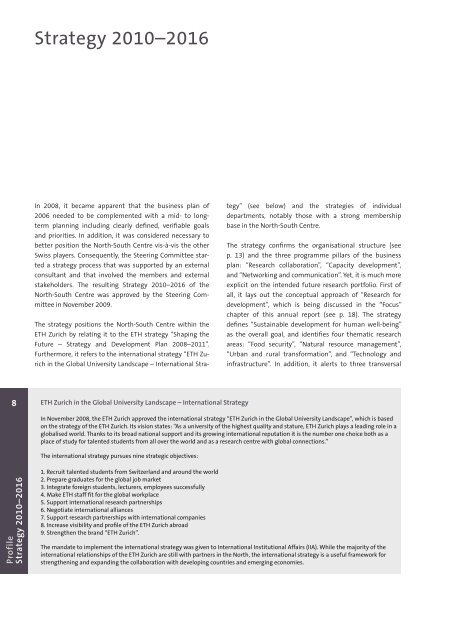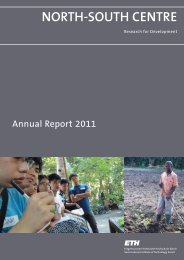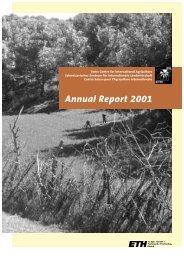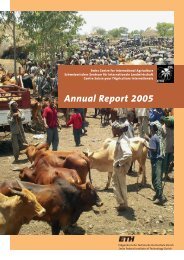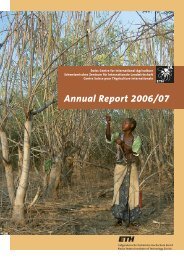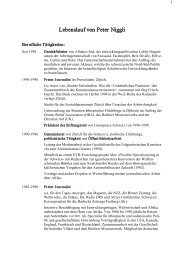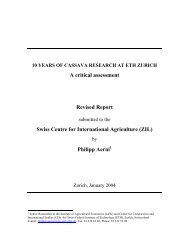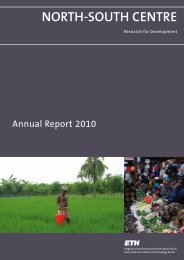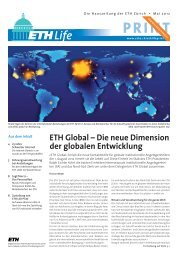NORTH-SOUTH CENTRE - ETH - North-South Centre North-South ...
NORTH-SOUTH CENTRE - ETH - North-South Centre North-South ...
NORTH-SOUTH CENTRE - ETH - North-South Centre North-South ...
Create successful ePaper yourself
Turn your PDF publications into a flip-book with our unique Google optimized e-Paper software.
Strategy 2010–2016<br />
In 2008, it became apparent that the business plan of<br />
2006 needed to be complemented with a mid- to longterm<br />
planning including clearly defined, verifiable goals<br />
and priorities. In addition, it was considered necessary to<br />
better position the <strong>North</strong>-<strong>South</strong> <strong>Centre</strong> vis-à-vis the other<br />
Swiss players. Consequently, the Steering Committee started<br />
a strategy process that was supported by an external<br />
consultant and that involved the members and external<br />
stakeholders. The resulting Strategy 2010–2016 of the<br />
<strong>North</strong>-<strong>South</strong> <strong>Centre</strong> was approved by the Steering Committee<br />
in November 2009.<br />
The strategy positions the <strong>North</strong>-<strong>South</strong> <strong>Centre</strong> within the<br />
<strong>ETH</strong> Zurich by relating it to the <strong>ETH</strong> strategy “Shaping the<br />
Future – Strategy and Development Plan 2008–2011”.<br />
Furthermore, it refers to the international strategy “<strong>ETH</strong> Zurich<br />
in the Global University Landscape – International Stra-<br />
tegy” (see below) and the strategies of individual<br />
departments, notably those with a strong membership<br />
base in the <strong>North</strong>-<strong>South</strong> <strong>Centre</strong>.<br />
The strategy confirms the organisational structure (see<br />
p. 13) and the three programme pillars of the business<br />
plan: “Research collaboration”, “Capacity development”,<br />
and “Networking and communication”. Yet, it is much more<br />
explicit on the intended future research portfolio. First of<br />
all, it lays out the conceptual approach of “Research for<br />
development”, which is being discussed in the “Focus”<br />
chapter of this annual report (see p. 18). The strategy<br />
defines “Sustainable development for human well-being”<br />
as the overall goal, and identifies four thematic research<br />
areas: “Food security”, “Natural resource management”,<br />
“Urban and rural transformation”, and “Technology and<br />
infrastructure”. In addition, it alerts to three transversal<br />
8 <strong>ETH</strong> Zurich in the Global University Landscape – International Strategy<br />
In November 2008, the <strong>ETH</strong> Zurich approved the international strategy “<strong>ETH</strong> Zurich in the Global University Landscape”, which is based<br />
on the strategy of the <strong>ETH</strong> Zurich. Its vision states: “As a university of the highest quality and stature, <strong>ETH</strong> Zurich plays a leading role in a<br />
globalised world. Thanks to its broad national support and its growing international reputation it is the number one choice both as a<br />
place of study for talented students from all over the world and as a research centre with global connections.”<br />
The international strategy pursues nine strategic objectives:<br />
Profile<br />
Strategy 2010–2016<br />
1. Recruit talented students from Switzerland and around the world<br />
2. Prepare graduates for the global job market<br />
3. Integrate foreign students, lecturers, employees successfully<br />
4. Make <strong>ETH</strong> staff fit for the global workplace<br />
5. Support international research partnerships<br />
6. Negotiate international alliances<br />
7. Support research partnerships with international companies<br />
8. Increase visibility and profile of the <strong>ETH</strong> Zurich abroad<br />
9. Strengthen the brand “<strong>ETH</strong> Zurich”.<br />
The mandate to implement the international strategy was given to International Institutional Affairs (IIA). While the majority of the<br />
international relationships of the <strong>ETH</strong> Zurich are still with partners in the <strong>North</strong>, the international strategy is a useful framework for<br />
strengthening and expanding the collaboration with developing countries and emerging economies.


